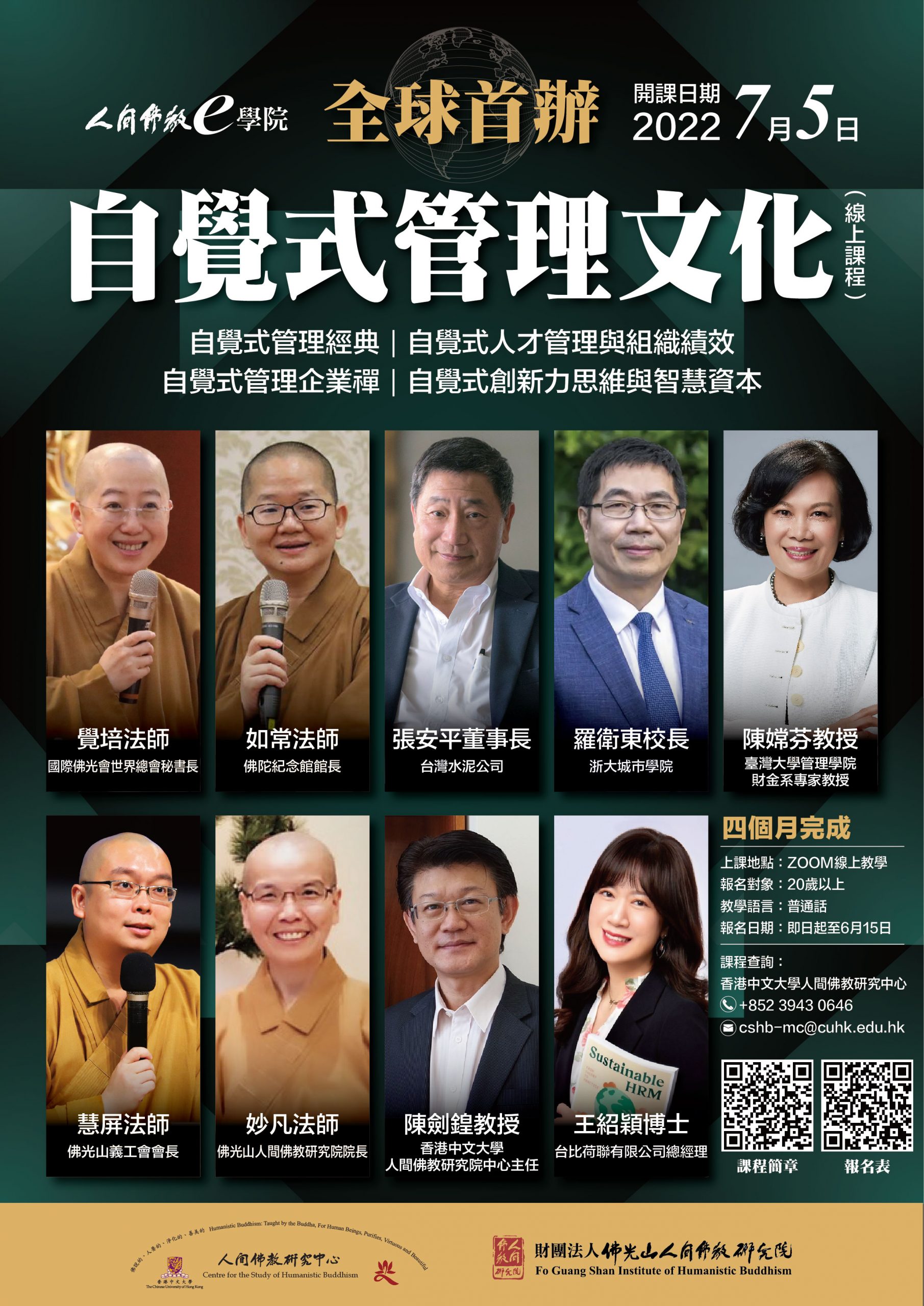Organizer
Centre for the Study of Humanistic Buddhism, The Chinese University of Hong Kong
Fo Guang Shan Institute of Humanistic Buddhism
Course Facets
- First-run: The world’s first online programme in self-conscious management.
- Teachers: Taught by renowned teachers in Buddhism, the academic and business circles.
- Dual certificates: Certificates from world-class universities and well-known Buddhist research institutes.
- Citta-dharma: Theory combining with practice – the management method that can be applied lifelong.
- Network: expand business contacts and increase individual competitiveness.
Target
Those who are engaged in management or are interested in inheritance of the culture management of Chinese.
- No restrictions on countries or regions, educational qualifications, or beliefs.
- 20 years old (inclusive) or above, no bad habits.
Objective
To combine the Humanistic Buddhist belief that inheriting Chinese culture with contemporary management, the course provides diversified thinking for business managers, establishes a comprehensive management culture, and realizes the sustainable development of enterprises.
- Conduct strategic analysis and rational decision-making by combining the Buddhist management theory and practice;
- Communicate and negotiate with customers by following the Buddha’s wisdom;
- Improve leadership skills to lead employees with various personality to increase team efficiency;
- Provide methods to identify and analyze the ethical corporate social responsibility as well as establish corporate culture.
Consultants and Teachers
Course Consultant
1. Master Cihui, Chairman of the Board of Directors of Fo Guang University
Course Director
1. Prof. CHEN Chien-huang, Director of Centre for the Study of Humanistic Buddhism, Chinese University of Hong Kong
2. Venerable Miao Fan, Dean of Fo Guang Shan Institute of Humanistic Buddhism
Teachers lineup
- Dr. Wang Shaoying, General Manager of Together Best And You(台比荷聯有限公司).
- Venerable Ru Chang, Curator of Fo Guang Shan Buddha Museum
- Venerable Miao Fan, Director of Dean of Fo Guang Shan Institute of Humanistic Buddhism
- Chairman Mr. Nelson Chang, Chairman of the Board of Directors of Taiwan Cement Corporation
- Professor Chen Changfen, expert professor of Finance Department, School of Management, National Taiwan University
- Professor CHEN Chien-huang, Director of the Centre for the Study of Humanistic Buddhism, the Chinese University of Hong Kong
- Venerable Huiping, President of Fo Guang Shan Volunteer Association
- Professor Luo Weidong, President of Hangzhou City University
- Venerable Jue Pei, Secretary-General of The Buddha’s Light International Association, Board of Directors of Headquarters
Course Structure
The course consists of four modules, 12 lessons for each module with a total of 48 lessons.
| Module Number | Module Name | Class | |
| HBMC 5005 | Self-Conscious management classic | 4 lectures, 12 lessons | |
| HBMC 5006 | Self-Conscious talent management and organizational performance | 4 lectures, 12 lessons | |
| HBMC 5007 | Chan of Self-Conscious Management Enterprise | 4 lectures, 12 lessons | |
| HBMC 5008 | Self-Conscious innovative thinking and intellectual capital | 4 lectures, 12 lessons |
Schedule
The weekly class is from 07:00pm to 09:30pm on Tuesday evening for each module, with 3 classes each time, one seminar for each module, and the course is completed in four months.
| Module | Course Title | First lecture | Second lecture | Third lecture | Fourth lecture | Seminar |
| 1 | Self-Conscious management classic | July 5 | July 12 | July 19 | July 26 | July 30 |
| 2 | Self-Conscious talent management and organizational performance | August 2 | August 9 | August 16 | August 23 | August 27 |
| 3 | Chan of Self-Conscious Management Enterprise | August 30 | September 6 | September 13 | September 20 | September 24 |
| 4 | Self-Conscious innovative thinking and intellectual capital | September 27 | October 4 | October 11 | October 18 | October 22 |
* The course organizer reserves the right of interpretation for any adjustment on the course schedule time and date.
* In case of special incidents or leave of lecturer, the course sponsor has the right to change all arrangements relevant to the course.
General Information
Inauguration Ceremony
7:30pm ~ 8:30pm July 3, 2022 (Sunday)
Commencement Date
07:00pm ~ 09:30pm July 5, 2022 (Tuesday)
Venue
ZOOM online teaching
Language
Mandarin
Criteria for Certificate
Students who complete this course and meet the following conditions will be jointly issued a certificate of completion of the “Programme in Self-Conscious Management Culture” by the Centre for the Study of Humanistic Buddhism of the Chinese University of Hong Kong and the Fo Guang Shan Institute of Humanistic Buddhism:
- At least 80% attendance for each module
- Submission of the Final Report of the course
Graduation Ceremony
3D2N meditation camp in Fo Guang Shan (Depends on the condition of COVID-19, expenses on air tickets, other transportation and accommodation are not covered on the tuition fee)
Admission Information
Admission Method
- Submission of the Application Form online
- Admission and payment
- After receiving the “Course Admission Notice” by email, please pay the tuition fee within five working days.
- Send the remittance receipt of the tuition fee (electronic file) to cshb-mc@cuhk.edu.hk.
Tuition Fee
NT$48,000
1. Course fees must be paid in full upon admission, and paid fees will not be refunded.
2. The paid tuition fees and admission qualifications are not transferable to others.
Application Date
From now until June 15, 2022 (Wednesday)
(until full)
Enquiries
Centre for the Study of Humanistic Buddhism, The Chinese University of Hong Kong
Tel: (852) 3943 0646
Email: cshb-mc@cuhk.edu.hk
Scan the QR Code for enquiry on the course
[QR Code]
WeChat


